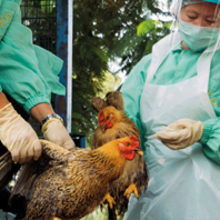Policy
Issue: Zoonotic diseases
05 November 2015 article

Disease outbreaks: preparedness through policy
The global health security threat posed by emerging infectious diseases has been pushed up the policy agenda in the wake of the unprecedented Ebola epidemic in West Africa. Initial failure to launch a rapid and coordinated international response to the epidemic starkly highlighted serious weaknesses in global surveillance and disease emergency response capabilities.
Learning lessons
In the immediate-term, at least, the Ebola epidemic has engaged policy-makers with the need to improve global preparedness for future disease outbreaks. Numerous inquiries have been set up to ‘learn lessons’ from the epidemic, including the World Health Organization’s (WHO) Ebola Interim Assessment Panel and the United Nations High-Level Panel on the Global Response to Health Crises. Global health security has also been a priority under Germany’s presidency of the G7, with proposals from an expert group taken to the G7 summit back in June. In the UK, two House of Commons Select Committee inquiries are scrutinising what the Government has learned from the UK Ebola response.
Strengthening surveillance
One area of consensus is the need to strengthen surveillance and healthcare systems, particularly better supporting low- and middle-income countries to do so. This is important to ensure collective international health security in a globalised world where diseases can easily cross borders, but also to provide health security to individuals regardless of where they live.
The WHO and 196 countries already have an agreement under the International Health Regulations (IHR) to report public health risks and build disease surveillance and response capacities. However, many countries have been unable to meet their IHR obligations, and the long delay in the WHO reporting Ebola as an international public health emergency showed weaknesses in its own systems. Many countries also went against guidance and imposed travel and trade restrictions, the economic and political implications of which might deter swift reporting of potential outbreaks. The WHO is now reviewing how to strengthen the effectiveness and implementation of the IHR.
Finding sufficient funding might be a challenge, but the expert panel that formed proposals presented to the G7 estimated that surveillance systems could be significantly boosted in many countries with as little as $12 million to $15 million annually. The G7 did announce that they would be supporting at least 60 countries over the next 5 years to prevent epidemics, in addition to supporting other global initiatives, although precise details were limited.
Rapid responses
The need to better structure and support the WHO to coordinate rapid disease emergencies responses has also been made clear. The WHO Ebola Interim Panel stated that the WHO lacked the culture, financing and capacity to currently do this. Consequently, at the World Health Assembly in May it was agreed to establish a specific WHO emergency programme and workforce, and to pilot a $100 million contingency fund for financing initial field operations during outbreaks. Securing necessary longer-term funding increases from Member States to support this work still poses a challenge however.
The expert panel that informed the G7 summit made strong proposals for an independent multilateral organisation to be setup within the WHO to be responsible for global outbreak response. They also called for $150 million to $200 million per year to maintain a reserve of thousands of scientists and public health workers ready for deployment in the event of a serious outbreak.
Research and development
The Ebola crisis also highlighted the need for more proactive development of vaccines, drugs and diagnostics, and the need for effective and transparent frameworks to roll out trials during epidemics, and to ensure the timely sharing of research data. This is something the WHO has been developing a framework to facilitate. The UK Government has said it will champion this including ensuring open access to UK publically funded research and data. Plans to invest £20 million towards a new UK Vaccines Research and Development Network to focus on the most serious disease threats have also been announced.
Microbiology Society policy activities
In June, the Society distributed its briefing Emerging Zoonotic Diseases to parliamentarians and policy-makers across the UK and Ireland. The briefing, and the importance of microbiology in tackling epidemics, was cited in a House of Lords debate on the Ebola outbreak. The briefing also prompted a Parliamentary Question to be asked about Middle East respiratory syndrome (MERS) to Ireland’s Minister for Health.
The Society, in collaboration with the Society for Applied Microbiology, also submitted evidence to the House of Commons Science and Technology Select Committee’s inquiry Science in Emergencies: the UK Lessons from Ebola.
FURTHER READING
Heymann, D. L. et al. (2015). Global health security: the wider lessons from the West African Ebola virus disease epidemic. Lancet 385, 1884–1901.
Health Plan (2015). Editorial. Nature 522, 5.
Microbiology Society (2015). Briefing: Emerging Zoonotic Diseases. http://microb.io/1SCnPIx
Ebola Interim Assessment Panel. World Health Organization. http://microb.io/ 1JxxoBr. Last accessed 18 August 2015.
Image: Testing hens for the avian influenza virus in Hong Kong, China. Dung Vo Trung/Look At Sciences/Science Photo Library..
